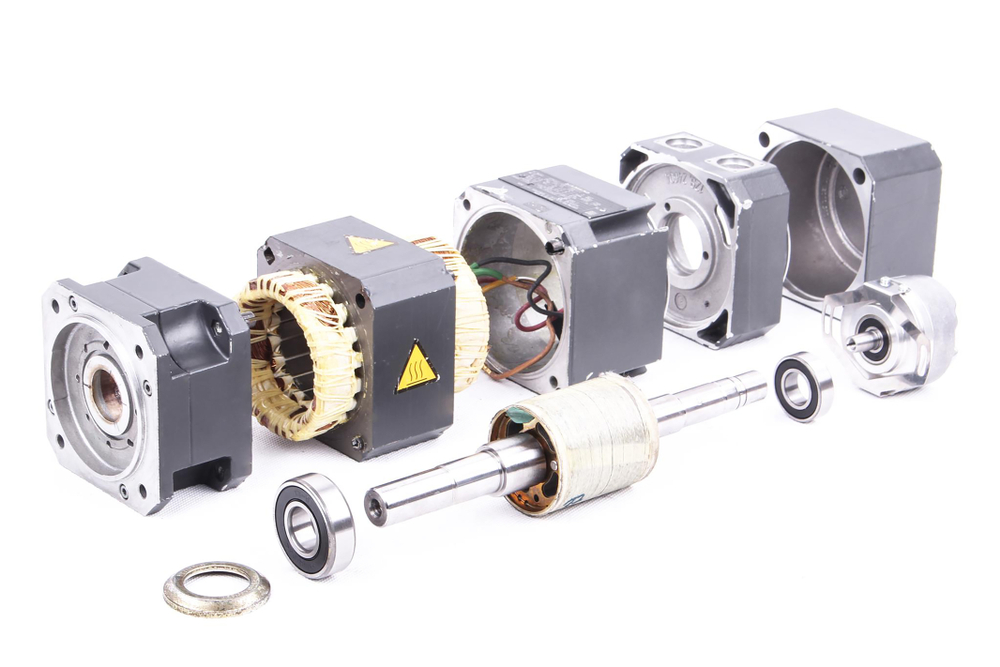Servo Motor Encoders: Common Failures and Repair Solutions

The difference between a reliable servo motor and a potential production nightmare often comes down to one small component: the encoder. These precision sensors measure shaft position and velocity, but they can fail in surprisingly predictable ways. Here’s what manufacturing teams need to know about common encoder problems — and how to fix them.
Understanding encoder function (and warning signs)
An encoder converts mechanical motion into electrical signals through a perforated disk mounted on the servo motor shaft. As the disk spins, it interrupts light beams passing through the perforations to photodetectors. This creates two offset pulse signals (A and B channels) that indicate both position and direction, plus an index pulse (Z channel) that marks each complete rotation. These signals help servo motors regulate speed and acceleration. When the encoder experiences trouble, so too will the servo motor.
Erratic position readings top the list of encoder red flags. A motor might jump between positions or drift from its programmed coordinates — both clear signs that something’s wrong with the feedback system. Other symptoms include:
- Unexpected servo alarms during normal operation, especially when the motor should be holding position.
- Position errors that grow larger over time, suggesting cumulative measurement problems.
- Intermittent loss of motor control, particularly during high-speed movements.

Root causes behind encoder failures
While encoders themselves are sophisticated components, most encoder issues trace back to three basic sources:
- Physical damage and wear: Constant vibration and movement can loosen encoder mounting screws or damage the delicate disk inside. Even microscopic shifts in alignment can throw off readings. Plus, normal wear on bearings can create positioning errors that compound over time.
- Environmental factors: Manufacturing environments are full of disruptive catalysts. Metal dust can infiltrate encoder housings, while oil mist and cleaning solutions degrade seals. Temperature swings stress internal components and can lead to condensation — a recipe for electrical problems.
- Electrical interference: Nearby welding operations, variable frequency drives, and even improperly shielded power cables can inject noise into encoder signals. This interference manifests as position errors or complete signal loss.
Strategies for troubleshooting encoders
As basic as encoder failures can be, the solutions are equally as straightforward. Start with the basics: remove debris, check mounting screws, and inspect cables for damage. Sometimes a thorough cleaning and proper retightening solve the problem. You can also use an oscilloscope to check encoder output signals. Clean, consistent waveforms indicate good encoder health, while irregular patterns point to mechanical or electrical issues.
If replacement is necessary, consider upgrading to more robust encoder models. Newer designs often feature better sealing and stronger resistance to electrical noise.
Get discount servo repairs
Dealing with a faulty encoder? Now through the end of January, GES is offering 10% OFF single repairs and 15% OFF 3+ repairs on servo motors. Don’t let encoder problems persist!
Prevention beats repair
If they’re not already part of your servo motor maintenance schedule, adding encoder checks to routines helps spot early warning signs. Simple steps like keeping cable runs separated from power lines and having proper grounding can prevent common issues. Spotting issues early goes a long way towards preventing bigger issues caused by unreliable encoder output.
Understanding encoder failures — and knowing how to address them — keeps production lines moving. With proper maintenance and quick intervention when problems arise, these essential components will continue to power reliable servo motor function.
